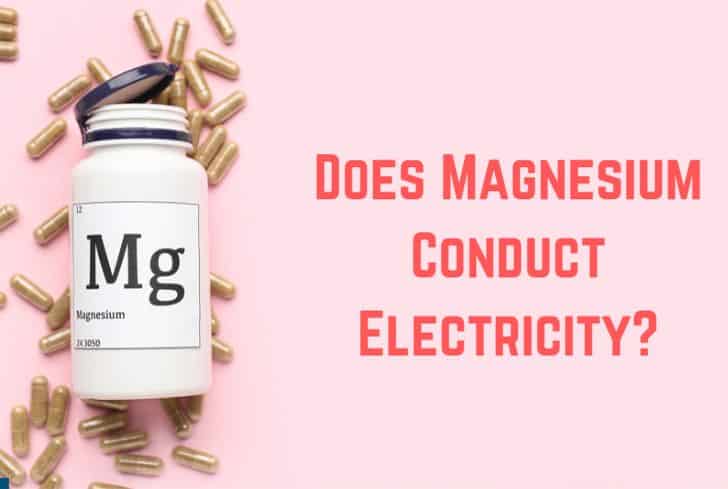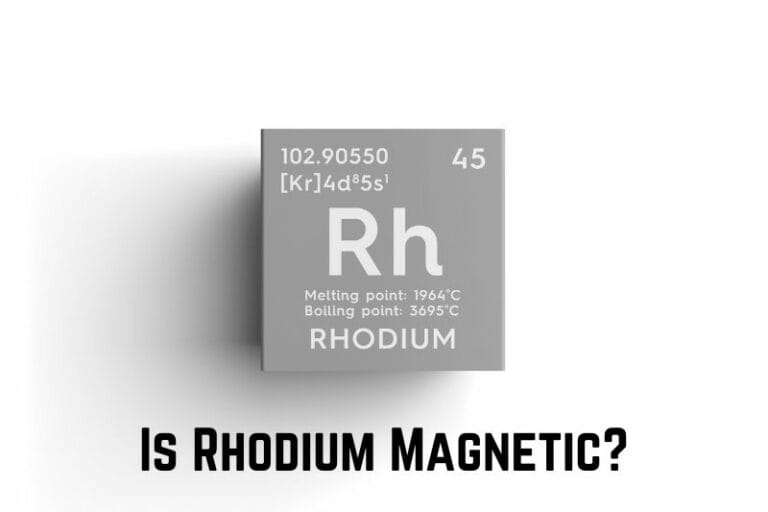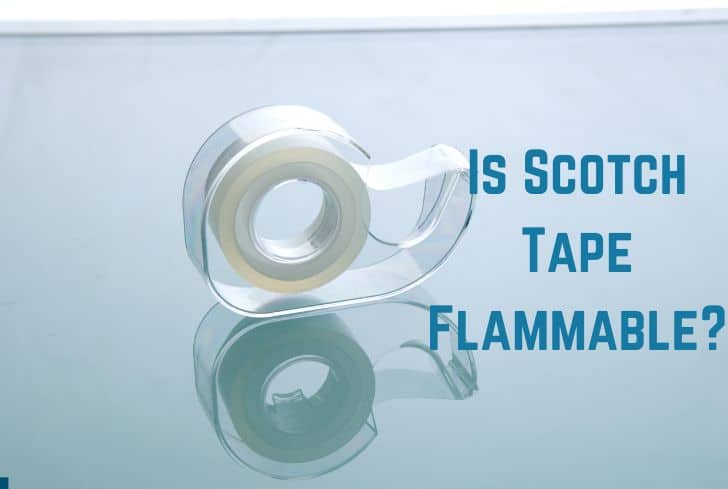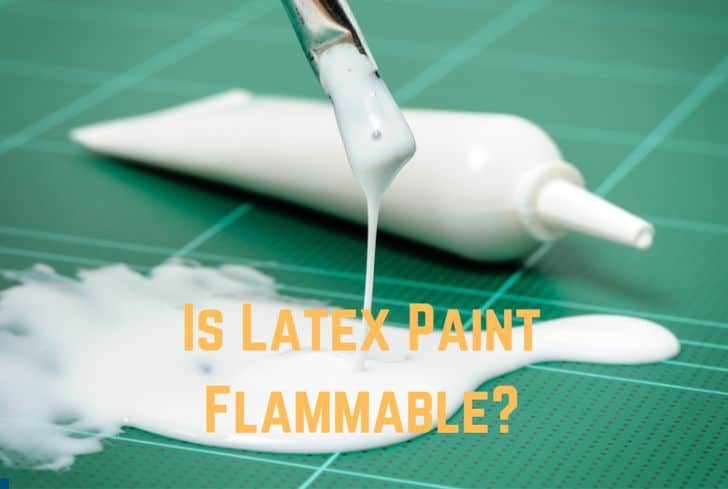Does Magnesium Conduct Electricity? (Answered)

Magnesium is a chemical element having the symbol Mg and atomic number 12. It belongs to group 2 on the periodic table, sharing many physical and chemical properties with the other five alkaline earth metals: beryllium (Be), calcium (Ca), strontium (Sr), barium (Ba), and radium (Ra). Its name comes from Magnesia, a district of Thessaly (Greece), where magnesia alba was first found.
Have you ever wondered if magnesium can conduct electricity? In this article, we are going to discuss just that. We will begin by looking at the properties of magnesium. Then we will learn how its various forms interact with electricity and heat.
Read: Does Diamond Conduct Electricity?
Is Magnesium Conductive?
Yes, magnesium is conductive. Like any other metal, it allows the flow of electricity and heat, although it is not a great conductor. For a material to conduct electricity, it must have free electrons that can move the electric charge from one place to the other. Magnesium does have free electrons, so it is conductive.
Metal ions form a giant structure known as “sea of delocalized electrons”, which are able to move freely. Like all metals, magnesium has these delocalized electrons that can carry electric charge from one point to another. That is why it conducts electricity.
However, magnesium is not a great conductor because it is highly reactive with oxygen, nitrogen, and carbondioxide. On contact with air, magnesium forms an impermeable oxide, which has very low conductivity.
If electrical equipment is made with magnesium, it will need to be treated to remove the oxide and configured into an air-tight connection. It woud still be not a great conductor and cost much more. Moreover, magnesium is highly flammable, which can make it quite dangerous.
Copper is a better conductor of electricity. Having the atomic number 29, it has 1 valence electron, compared to 2 valence electrons of magnesium. It is easier to dissociate a single electron from the metal; copper’s conductivity is about 2.5 times better than magnesium’s.
Properties of Magnesium
These are the properties of magnesium:
- Physical Properties: Elemental magnesium is a lightweight metal that ranges from gray to white in colour. It has two-thirds the density of aluminium, and it is quite brittle, breaking easily along shear bands. Magnesium has the lowest melting (923 K or 650 °C) as well as the lowest boiling point (1,363 K or 1,090 °C) of all the alkaline earth metals. Magnesium has to be combined with other metals like aluminium to become malleable.
- Chemical Behaviour: Magnesium tarnishes slightly when exposed to air. But it produces a thin layer of protective oxide that is quite impermeable, so it doesn’t require an oxygen-free environment unlike the other alkaline earth metals. In powder form, magnesium reacts with water to produce hydrogen, although it reacts slower than calcium. Magnesium also reacts exothermically with most acids like hydrochloric acid.
- Flammability: Magnesium is highly flammable, especially when it is powdered or shaved into thin strips. Flame temperatures of magnesium and its alloys can reach 5,610 °F (3,100 °C), and these fires are particularly difficult to extinguish because combustion continues in nitrogen, carbondioxide, and even water. This is why it was used for firebombing during WWII, where the only defence was to smother the flame with sand.
- Light Properties: When burnt in air, magnesium produces a brilliant-white light, which includes strong ultraviolet wavelengths. Magnesium powder was used as flash powder in early days of photography to illuminate the scene. Later, it was used in single-use photography flashbulbs. Magnesium is now used in military flares, fireworks, and for various other theatrical effects.
- Occurence: Magnesium does not occur free in nature, and it was originally known through compound such as magnesia alba ( oxide) and magnesite (carbonate). Magnesium is the eighth-most abundant element in the Earth’s crust and is found in large deposits of magnesite, dolomite, and in mineral waters. It is produced in large stars from the sequential addition of three helium nuclei to a carbon nucleus.
Commercially, magnesium is produced by electrolysis of molten magnesium chloride (MgCl2), mainly processed from seawater. It can also be obtained by the reduction of magnesium compounds with suitable reducing agents.
Read: Does Rubber Conduct Electricity? (Is Rubber an Insulator?)
Does Magnesium Conduct Electricity When Molten?
Yes, magnesium conducts electricity in both its solid and molten state. Some compounds of magnesium (magnesium bromide, magnesium chloride, etc.) may not be conductors in their solid state, but in their liquid state, they are able to conduct electricity.
In solid state, the atoms of many compounds (magnesium bromide, for example) are tightly held together, which inhibits the free movement of electrons. However, when these are dissolved into water, they dissociate into ions.
These ions are free to move and can transfer electric charge from one place to another. This is why many magnesium compounds can conduct electricity when in a liquid state.
Elemental magnesium is able to conduct electricity even in solid state because, like all metals, it has a sea of delocalized electrons that can move freely and conduct electricity.
Does Magnesium Bromide Conduct Electricity?
Yes, magnesium bromide conducts electricity when dissolved in water. Magnesium bromide is an electrolyte, a substance that dissolves in water to produce ions that conduct electricity.
Magnesium bromide is a chemical compound of magnesium and bromine having the chemical formula MgBr2. MgBr2 is highly soluble in water. In the liquid state, magnesium bromide dissociates into ions and conducts electricity.
Does Magnesium Carbonate Conduct Electricity?
Yes, magnesium carbonate conducts electricity when dissolved in water. Magnesium carbonate (MgCO3), also known as magnesium alba, is an inorganic salt that is colorless or white. It conducts electricity because it is an ionic compound.
Ionic compounds generally form crystals, have high melting/boiling points, and are hard. They do not conduct electricity as solids, but when dissolved in water, they do.
Magnesium carbonate, when dissolved in water, dissociates into ions that are able to move freely. This is how it conducts electricity.
Read: Does Ice Conduct Electricity?
Does Magnesium Chloride Conduct Electricity?
Magnesium chloride conducts electricity only in molten or liquid state. Magnesium chloride has the chemical formula of MgCl2, and it can be extracted from sea water. Besides the anhydrous form, magnesium chloride comes in various hydrates, which are ionic compounds, which are soluble in water and conduct electricity.
Magnesium chloride is an ionic compound. When dissolved in water, it dissociates into ions that can move freely. These free moving ions are able to pass the electric charge from one place to another. Hence magnesium chloride conducts electricity.

Does Magnesium Oxide Conduct Electricity?
No, magnesium oxide cannot conduct electricity. It is formed when magnesium shares its two valence electrons with the oxygen atom having a deficiency of two electrons to complete its orbit. This leads to a neutral charge, and hence magnesium cannot conduct electricity.
In order to conduct electricity, there must be free-moving electrons that can pass the electric charge from one place to another. However, when magnesium oxide is formed, magnesium shares it two valence electrons with oxygen, which has a deficiency of two electrons.
This leads to MgO, which has a neutral charge, and therefore there are no free electrons to move around and conduct electricity.
Is Magnesium an Insulator or Conductor?
Magnesium is a conductor of both heat and electricity. In order to conducive, a material has to have free electrons that can pass the heat or electricity. Being a metal, magnesium does have these free electrons and can conduct both. However, it is not a great conductor of electricity.
A conductor is a material that allows the flow of electrons through it, therefore allowing the transfer of heat and electricity. An insulator, on the other hand, inhibits the flow of electrons and subsequently of heat and electricity.
Magnesium, being a metal, has a sea of delocalized electrons that can move freely. Like charges repel each other, so the motion of one free electron dislodges the next atom, and the process goes one. The electrons keep moving in the direction of the current, that is, towards the positively charged end.
You can check out this animated video by FuseSchool to under how metals conduct electricity.
Does Magnesium Conduct Heat?
Yes, magnesium conducts heat. Like all metals, it has delocalized electrons, which can move freely and pass the heat/electric charge from one place to another. The thermal conductivity of magnesium is affected by temperatures.
In order for electricity or heat to flow through a material, it should have free electrons that can pass the charge or heat. Magnesium, being a metal, has a sea of delocalized electrons. With heat, these electrons vibrate, causing the adjacent electron to also vibrate.
The kinetic energy/motions allow heat to move through the metal, and this is quite similar to how we rub our hands to feel warm. The thermal conductivity of magnesium is affected by temperature variations and alloying.
Conclusion
In this article, we have discussed whether magnesium conducts electricity or not. Being a metal, magnesium has a sea of delocalized electrons that are able to move and transfer the electric charge/heat from one point to another. Hence magnesium is a conductor, although not a very good one because of its other properties. We also looked at different forms of magnesium and their conductivity.






